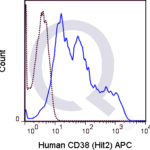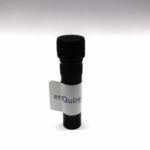Human Anti-CD38 Antibody Product Attributes
CD38 Previously Observed Antibody Staining Patterns
Observed Subcellular, Organelle Specific Staining Data:
Staining with anti-CD38 antibody reveals CD38 expression is expected to be primarily localized to the plasma membrane.
Observed Antibody Staining Data By Tissue Type:
Variations in CD38 antibody staining intensity in immunohistochemistry on tissue sections are present across different anatomical locations. An intense signal was observed in glandular cells in the prostate and seminal vesicle and non-germinal center cells in the lymph node and tonsil. More moderate antibody staining intensity was present in glandular cells in the prostate and seminal vesicle and non-germinal center cells in the lymph node and tonsil. Low, but measureable presence of CD38 could be seen in. We were unable to detect CD38 in other tissues. Disease states, inflammation, and other physiological changes can have a substantial impact on antibody staining patterns. These measurements were all taken in tissues deemed normal or from patients without known disease.
Observed Antibody Staining Data By Tissue Disease Status:
Tissues from cancer patients, for instance, have their own distinct pattern of CD38 expression as measured by anti-CD38 antibody immunohistochemical staining. The average level of expression by tumor is summarized in the table below. The variability row represents patient to patient variability in IHC staining.
| Sample Type | breast cancer | carcinoid | cervical cancer | colorectal cancer | endometrial cancer | glioma | head and neck cancer | liver cancer | lung cancer | lymphoma | melanoma | ovarian cancer | pancreatic cancer | prostate cancer | renal cancer | skin cancer | stomach cancer | testicular cancer | thyroid cancer | urothelial cancer |
|---|---|---|---|---|---|---|---|---|---|---|---|---|---|---|---|---|---|---|---|---|
| Signal Intensity | – | – | – | – | – | – | – | – | – | – | – | – | – | – | – | – | – | – | – | – |
| CD38 Variability | + | + | + | + | + | + | + | + | + | + | + | + | + | + | + | + | + | + | ++ | + |
| CD38 General Information | |
|---|---|
| Alternate Names | |
| CD38, ADPRC1, ADPRC 1 | |
| Curated Database and Bioinformatic Data | |
| Gene Symbol | CD38 |
| Entrez Gene ID | 952 |
| Ensemble Gene ID | ENSG00000004468 |
| RefSeq Protein Accession(s) | NP_001766 |
| RefSeq mRNA Accession(s) | NM_001775, NR_132660 |
| RefSeq Genomic Accession(s) | NC_000004, NC_018915 |
| UniProt ID(s) | P28907, B4E006 |
| UniGene ID(s) | P28907, B4E006 |
| HGNC ID(s) | 1667 |
| Cosmic ID(s) | CD38 |
| KEGG Gene ID(s) | hsa:952 |
| PharmGKB ID(s) | PA26214 |
| General Description of CD38. | |
| The HB7 antibody is specific for human CD38, a 45 kDa type II transmembrane glycoprotein expressed on thymocytes, plasma cells, and monocytes as well as other non-hematopoietic cells. T and B lymphocyte expression is discontinuous and varies based on differentiation state present on immature cells, low on intermediate stages, and high on activated mature cells. It is found on most CD34+ cells, but not on pluripotent stem cells. CD38 is an ectoenzyme that functions to catalyze the synthesis and hydrolysis of cyclic ADP-ribose and is involved in cell signaling, regulating cell adhesion, and activation. Additionally, CD38 has been shown to be a prognostic marker for some leukemias and other diseases. | |

![Anti-CD38 Antibody [HB7]](https://cdn-enquirebio.pressidium.com/wp-content/uploads/2017/10/enQuire-Bio-QAB92-PE-100Tests-anti-CD38-antibody-10.png)




There are no reviews yet.